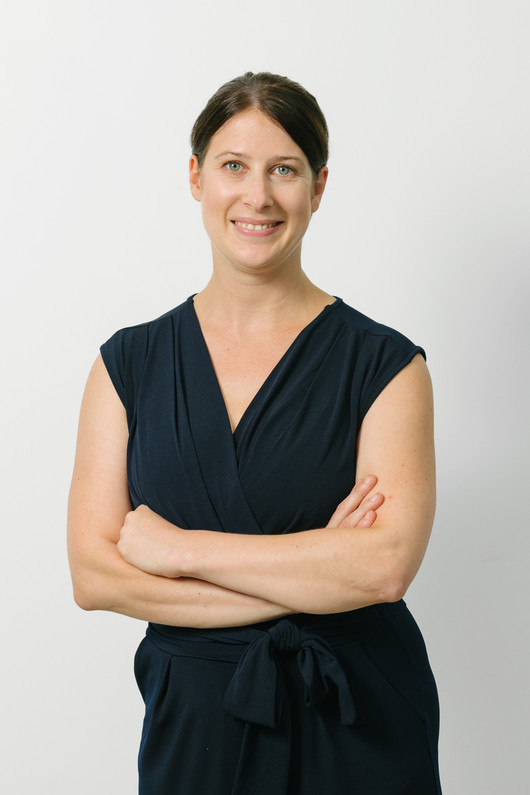Groups
CeMM Principal Investigator
Barbara Maier
Tumor immunology
+43 1 40160 70058
Send an e-mail

Our group is studying interactions within the microenvironment of solid tumors that cause immune-suppression and tumor immune evasion. Our overall aim is to understand and break through limitations of current immunotherapies. We want to develop novel immunotherapy concepts by modulating and reprogramming specific immune cell compartments to achieve optimal immunity against tumors. Questions that fuel our research are: How can we empower antigen-presenting cells to prime effective tumor-directed T cell responses? What antigen-presenting cell phenotypes play a role in T cell polarization and restimulation at the tumor site and how do they drive/limit T cell exhaustion? What factors drive T cell exhaustion in the tumor microenvironment and the draining lymph node? What specific pathways need to be targeted in tumor-associated myeloid cells to break their immune-suppressive properties?
To achieve our goals, we combine cell-culture based high-throughput technologies with mechanistic in vivo studies, single-cell transcriptomics and immune-profiling of patient-derived tumor material.
Tumor microenvironment
The microenvironment of solid tumors is characterized by a multitude of immune-suppressive factors, such as cytokines, high apoptotic cell load, unique extracellular matrix composition, hypoxia, scarcity of nutrients, metabolic waste products, and others. As a result, the functionality of many different immune and stromal cell populations is compromised, and tumor immune evasion is facilitated. In addition to cancer cells, various immune cell subsets take part in shaping the suppressive tumor microenvironment, which in turn locally drives cancer-associated immune-regulatory phenotypes of monocytes, macrophages, fibroblasts and dendritic cells, often coupled with regulatory T cells and exhausted T cells that are unable to mount tumor-directed cytotoxic responses. In our group we aim to target immune-suppressive phenotypes of myeloid cells, paired with already established immunotherapies such as immune checkpoint blockade, to allow for optimal immune responses within the TME. Our ultimate goal is to identify cellular, molecular and spatial determinants that stimulate or suppress human tumor immunity and to target suppressive phenotypes, while enabling effector populations.
Antigen-specific tumor-directed immune responses
Tumor-directed T cell responses are a prerequisite for successful immunotherapy, however, often T cells have an exhausted phenotype in the tumor microenvironment and fail to eliminate tumor cells. Exhausted T cells are functionally defined by limited cytokine production and cytotoxic effector function and inefficiency to clear the cellular source of antigen. Unlike functional memory and effector T cells, exhausted T cells are dependent on persistence of presented antigen. Hence, direct antigen-presenting cell/T cell contact is critical in driving T cell exhaustion. We are exploring how polarization/restimulation with different tumor-associated antigen-presenting cells shape T cell phenotypes and how different antigen-presenting cell subsets and phenotypes drive or limit antigen-specific anti-tumor immunity.
Immune Checkpoint Blockade in solid tumors
The development of immunotherapies, particularly those blocking the immune checkpoint PD-1/PD-L1, has revolutionized lung cancer treatment. Paradoxically, the mechanisms of action of PD-1/PD-L1 blockade are still incompletely understood and only a subset of patients responds to immune checkpoint blockade (ICB). PD-L1 expression on both infiltrating immune cells and/or tumor cells can be predictive for therapeutic success of ICB, suggesting that multiple mechanisms for T cell suppression involving PD-L1 expression on different compartments exist. We are trying to understand what antigen presenting cell types are involved in mediating responses to ICB; whether the mechanisms of action require antigen presenting cell/T cell interactions in the draining lymph nodes or at the tumor site; and what stages of T cell differentiation/maturation are targeted.
Biosketch
Barbara Maier studied molecular biology at the University of Vienna and obtained her PhD from MedUni Vienna, working on deciphering the role of type I interferon in pulmonary inflammation under the mentorship of Professor Sylvia Knapp. She focused on bacterial infections in the lung and peritoneum and the protective or detrimental roles of inflammatory mediators therein. She then continued her training as a postdoctoral fellow in the laboratory of Professor Miriam Merad at the Icahn School of Medicine at Mount Sinai in New York (USA). There, she gained extensive knowledge of human tumor immunology and myeloid components of tumor immune suppression. In her main work, she uncovered a regulatory module expressed in dendritic cells in human non-small-cell lung cancer patients, functionally validated multiple of these regulatory molecules, and showed that modulating the regulatory program in dendritic cells leads to improved tumor control. Barbara Maier joined CeMM as a principal investigator in January 2021. Her lab focuses on tumor immunology and specifically on the dynamics of antigen-presenting cell/T-cell interactions in the tumor microenvironment and tumor-draining lymph nodes and how tumor-associated antigen-presenting cell phenotypes shape tumor-directed T-cell responses.
Selected Papers
LaMarche, N.M., Hegde, S., Park, M.D. et al. An IL-4 signalling axis in bone marrow drives pro-tumorigenic myelopoiesis. Nature 2023 Dec 6. (abstract)
Park, M.D., Reyes-Torres, I., LeBerichel, J. et al. TREM2 macrophages drive NK cell paucity and dysfunction in lung cancer. Nat Immunol 2023 May; 24:792–801. (abstract)
A Gainullina et al. Network analysis of large-scale ImmGen and Tabula Muris datasets highlights metabolic diversity of tissue mononuclear phagocytes. Cell Rep. 2023 Feb 28;42(2):112046. (abstract)
Fendl B, Berghoff AS, Preusser M, Maier B. Macrophage and monocyte subsets as new therapeutic targets in cancer immunotherapy. ESMO Open. 2023 Feb;8(1):100776. (abstract)
Cohen M, Giladi A, Barboy O, Tanay A, Merad M, Amit I, et al. The interaction of CD4+ helper T cells with dendritic cells shapes the tumor microenvironment and immune checkpoint blockade response. Nat Cancer. 2022 Mar;3(3):303-317. (abstract)
Leader A, et al. Single-cell analysis of human non-small cell lung cancer lesions refines tumor classification and patient stratification. Cancer Cell. 2021 Dec 13;39(12):1594-1609.e12. (abstract)
Casanova-Acebes M, et al. Tissue-resident macrophages provide a pro-tumorigenic niche to early NSCLC cells.Nature. 2021 Jul;595(7868):578-584. (abstract)
Maier B et al. A conserved dendritic cell regulatory program limits antitumor immunity. Nature. 2020 Apr;580(7802):257-262. (abstract)
Ruiz de Galarreta M, et al. β-catenin activation promotes immune escape and resistance to anti-PD-1 therapy in hepatocellular carcinoma. Cancer Discov. 2019 Jun 11. (abstract)
Jordan S, et al. Dietary intake regulates the circulating inflammatory monocyte pool. Cell. 2019 Aug. 22. (abstract)
